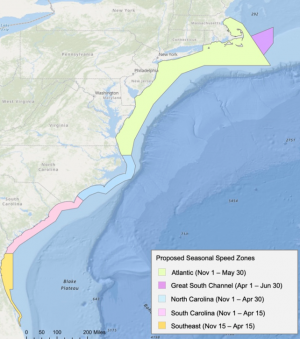
OCEAN CITY – While a proposed rule to reduce offshore speed limits for recreational and commercial vessels to further protect endangered North Atlantic right whales continues to hang in the balance, a fishing advocacy group this week fired off a call to action for its members seeking a pause on the change.
In an effort to save endangered North Atlantic right whales, the National Oceanic and Atmospheric Administration (NOAA) has proposed a 10-knot speed restriction for recreational and commercial vessels 35 feet in length or greater, down from the current 65 feet. The proposed rule change would expand the go-slow zones to include virtually the entire east coast out to a 90-mile radius and extend the zone restrictions as long as seven months out of the year.
It’s important to note the proposed 10-knot rule change, if implemented by NOAA, would be in effect off the mid-Atlantic coast, including Ocean City, from Nov. 1 to May 31, avoiding the height of the summer recreational fishing and boating seasons. However, provisions in the proposal allow for implementing the 10-knot rule in any areas where endangered right whales are detected at any time of the year.
Earlier this month, the environmental advocacy group Oceana filed an emergency petition with NOAA urging the federal government to implement the 10-knot rule immediately. This week, the Recreational Fishing Alliance (RFA) put out a call to action for its thousands of recreational boating and fishing members to contact their representatives in Congress urging them to pause any decision on NOAA’s proposed 10-knot rule.
The local fishing and boating community has already weighed in heavily on the proposed rule change during the public comment period, which ended late last month.
“Thousands of anglers and boaters like you have voiced their concerns over the serious flaws of this proposal,” RFA’s letter reads. “Now, we need our leaders in Congress to help us turn the tide and pause this rule until reasonable solutions can be found. Please demand that they weigh in.”
According to NOAA, the latest estimate puts the entire North American right whale population at around 350, including fewer than 100 breeding females. The right whales migrate up and down the east coast and in and out of the fishing grounds and shipping lanes at different times during the year to their known calving grounds in more shallow and warmer climates.
However, locally and up and down the coast, fishing advocates have said the data doesn’t suggest vessel strikes are the primary cause of the whale’s mortality rates. For example, according NOAA’s own data, there have only been 12 lethal right whale vessel strikes since 2008, five of which have come from vessel’s under 35 feet. From NOAA’s own data, the chance of a vessel striking a right whale, considering the sheer volume of boat traffic in the prescribed zones for the rule change, is about on in a million.
The RFA call to action to its members asserts NOAA’s proposed 10-knot rule was largely crafted without input from certain stakeholder groups, including the recreational and commercial fishing industries.
“Remember, if finalized, vessels 35 feet and larger would have to travel 10 knots or slower on essentially the entire Atlantic coast for as long as seven months of the year,” the letter reads. “This rule was developed largely behind closed doors without your stakeholder input up until the public comment period. It’s essential that we act now to oppose this ill-conceived rule that will cripple the recreational saltwater fishing and boating industry.”
The RFA letter cites potential risks to recreational anglers and boaters caused by the proposed 10-knot rule.
“The proposed speed restrictions will put human life at risk, devastate the recreational fishing and boating industry and threaten small businesses along the Atlantic coast,” the letter reads. “Recreational anglers and boaters understand the need to safeguard America’s waters and endangered wildlife, including North Atlantic right whales. We agree that conservation measures must be developed with the best available science and that they are consistent with the magnitude of the risk a particular activity poses.”
The RFA letter suggests NOAA’s proposed 10-knot rule was crafted in a vacuum with little or no regard for the potential impact on the recreational and commercial fishing and boating industries.
“Unfortunately, NOAA’s proposed rule fails on these key principles in natural resource management,” the letter reads. “With less than a one-in-a-million chance a recreational vessel 35 feet to 65 feet will strike a right whale, the proposed restrictions are unnecessarily severe and effectively turn the entire Atlantic coast into a go-slow zone for much of the year.”
The RFA letter adds, “Vessel speed is a significant safety feature on a recreational boat, and the proposed restrictions will reduce the ability of boaters to outrun weather or otherwise safely operate their vessel in an appropriate manner for the given sea conditions,” the letter reads. “… Should NOAA’s proposed rule go into effect, not only will lives be jeopardized, but thousands of recreational boating and fishing trips will be cancelled, threatening a critical economic engine for Atlantic coastal communities and a major source of conservation funding nationwide.”

